
Pregnancy and hormonal changes that continue 12 weeks after giving birth increase a woman's risk of heart attack, researchers said.
Although the likelihood of having a heart attack during pregnancy is very low -- just 1 in every 16,000 de11liveries -- it is still 3 to 4 times higher than non-pregnant women of the same age.
Moreover, heart attacks during pregnancy tend to be more severe and lead to more complications, according to a study presented at the annual scientific sessions of the American College of Cardiology meeting in Chicago this week.
Hormonal changes, increased blood volume and other physiological changes that happen during pregnancy increase the risk, researchers said, adding that heart attacks happen for different reasons in pregnant women than those commonly seen in the general population.
Atherosclerosis, a narrowing of the arteries, is the most common cause of heart attack in the general population, but this was the cause in only a third of pregnant women who had a heart attack, they said.
The more common reason pregnant women had a heart attack was a condition called coronary dissection, a separation of the layers of the artery wall that blocks blood flow. They said this condition is very rare among non-pregnant patients.
This suggests that in at least some cases, the traditional approach to treating the condition during pregnancy and post partum may not always be best, researchers said.
"We have very clear guidelines for (heart attack) in the general population. These guidelines, however, may not always apply to women with pregnancy-associated heart attacks and may actually cause more harm than good," said Dr. Uri Elkayam of the University of Southern California in Los Angeles and the study's lead researcher.
An analysis of 150 cases taken since 2005 were added to the 228 cases taken prior to 2005 for the study.
Researchers found that most pregnant women did not have traditional cardiovascular risk factors, such as high cholesterol, high blood pressure and diabetes. Yet their heart attacks were more severe and the death rate was 2 to 3 times higher than what is expected of non-pregnant women the same age.
